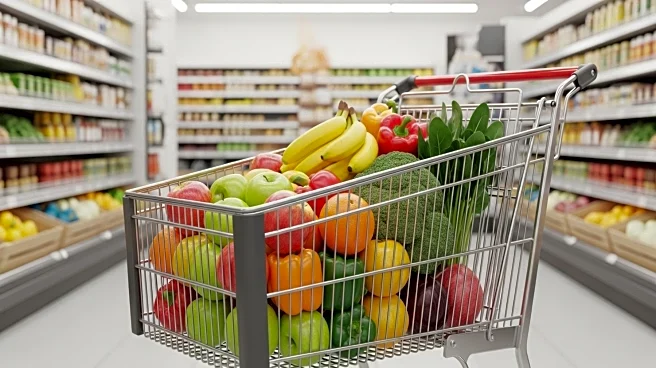What is the story about?
What's Happening?
Amazon has announced the launch of Amazon Grocery, a new private-label brand that consolidates popular items from Amazon Fresh and Happy Belly into a 'grocery essentials' collection. This new brand features over 1,000 grocery items, including milk, olive oil, produce, meat, and seafood, with most products priced under $5. The initiative aims to cater to consumers who are increasingly price-conscious, according to Jason Buechel, Vice President of Amazon Worldwide Grocery Stores and CEO of Whole Foods Market. The brand's packaging is designed to reduce plastic usage and features a modern, clean design. Amazon Grocery products are available nationwide through Amazon.com and Amazon Fresh, both online and in stores.
Why It's Important?
The launch of Amazon Grocery is significant as it addresses the growing demand for affordable grocery options amidst economic pressures. By offering a wide range of products at competitive prices, Amazon is positioning itself to capture a larger share of the grocery market, potentially impacting traditional grocery retailers. The move also reflects a broader trend of consumers seeking value and quality in their purchases, which could influence pricing strategies across the industry. Additionally, the emphasis on reduced plastic usage aligns with increasing consumer awareness and demand for sustainable practices, potentially setting a precedent for other retailers.
What's Next?
Amazon plans to expand its product offerings under the new brand, with additional options like frozen pasta meals, pie fillings, granola, and more frozen vegetables expected in the coming months. This expansion could further solidify Amazon's presence in the grocery sector and attract more consumers looking for convenience and affordability. The company's recent settlement with the Federal Trade Commission over misleading Prime subscription practices may also influence its future business strategies and consumer trust.
Beyond the Headlines
The introduction of Amazon Grocery could have long-term implications for the grocery industry, particularly in terms of competition and pricing. As Amazon continues to innovate and expand its product lines, traditional grocery stores may need to adapt to maintain their market share. The focus on sustainable packaging could also drive industry-wide changes, encouraging other retailers to adopt similar practices to meet consumer expectations.















